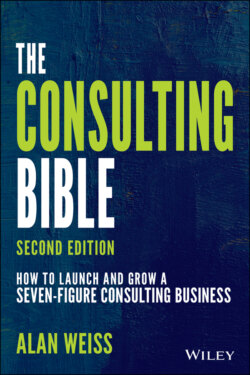Читать книгу The Consulting Bible - Alan Weiss - Страница 59
Principles of Leverage
Оглавление1 Always provide a choice of “yeses.”Never give someone a “take it or leave it” choice if you can possibly avoid doing so. In a proposal, always provide options. But even in a next meeting, you enhance your chances by saying: “We seem to need more time to establish objectives for the project. I can meet you tomorrow, same place, same time; or if you'd prefer to get off site, breakfast or lunch is possible Thursday or Friday; or, if you prefer to do this by phone, then I can do that any afternoon this week if I can have an uninterrupted hour of your time. What's best for you?”3If you're dealing with a gatekeeper or intermediary: “You can introduce me to the vice president and set up a meeting for the three of us; or you can set up the meeting for me alone; or I can contact the vice president using your name. Which do you prefer?”My estimate is that you improve the chances of a favorable response by at least 50 percent by providing a choice of “yeses.” This is, as you can imagine, particularly crucial in proposals, and we'll delve into the technique more deeply once we arrive at that stage of the process.
2 Never bundle; always unbundle.A colleague of mine, Paul, provided tele‐sales training and improvement, which included:Discussions with management teamCustom tailoring of programPersonal deliveryCDs and text materialsFollow‐up with buyerSpouse programE‐mail and phone response for 30 daysTwo and a half days of onsite trainingRecording allowed for remote locationsInclusion in newsletter subscriptionAccess to new intellectual property (IP) as producedPaul charged $7,500 for this. I would have charged $75,000.Paul threw everything but the kitchen sink into his offer. I would have broken these into options and menu items.Paul focused on the deliverables. I would have focused on the results and value produced as a consequence of these deliverables.Most consultants tend to bundle their products and services because they basically are insecure about their worth and want to provide as much stuff as they can to justify fees. That's why my system begins with conceptual agreement on outcomes and value.Don't bundle. When you call a plumber, the plumber doesn't say, “And while I'm there fixing the drain, I can also caulk the tub and re‐grout the tile.”
3 Ensure that your full array of capabilities is manifest and understood.I actually still hear from consultants, “But if I claim to do all these things, won't I be seen as a jack‐of‐all‐trades?” Isn't it ridiculous how empty adages, this one from the early seventeenth century, affect so many people supposedly living in a modern world? “Jack‐of‐all‐trades, master of none.” This isn't a zero‐sum game, and we're not talking about laying bricks or tending cows.A very good client of mine, the CEO of an insurance company for whom I had been working for two years, said to me, “Can you recommend a keynote speaker for the American Council of Life Insurance annual meeting of CEOs? I'm the program chair.” It took me a day to convince him that I wasn't trying to create a gig for myself but that I was and am a highly sought (Hall of Fame) keynoter.He had never known. Why should he? I had never told him!Here's how to do this gracefully:Provide all your capabilities in your electronic and written materials.Gather testimonials about all that you do, regardless of frequency.Cross‐pollinate; for example, mention your consulting in your speeches, refer to a speech you made while talking to a consulting buyer, and so forth, whether it's coaching, facilitating, publishing, training—whatever.Never narrow yourself unduly. Maintain a broad value proposition. Don't focus on a niche. And ban the phrase “specialize or die” to the same trash bin as “jack‐of‐all‐trades.”
4 Gain referrals ruthlessly.Learn this phrase: “Referrals are the coinage of my realm.”Repeat it to yourself whenever you can, then say it glibly to your clients, as in: “Referrals are the coinage of my realm, and I'm wondering who you know who could also benefit from the kind of value I've provided here.” (Keeping with the choice of “yeses”: “You may introduce us, or I can merely use your name, or I'll keep your name out of the conversation—which do you prefer?”)You should be asking all of your contacts for referrals at least once a quarter. Virtually no consultants do this well. They feel as if they are asking for a favor instead of setting up a win‐win‐win scenario: good for the ultimate referral, good for the person making the referral, good for you.KEY: Ask by name or title. “I'd like to meet the president of your largest supplier” or “You keep mentioning Sarah James and I'd like to be introduced.”We all provide references to our doctors, lawyers, dentists, accountants, auto mechanics, and so forth as a common courtesy. What's different here? Nothing. But those people don't often refer others to you because they usually have more knowledge about the dark side of the moon than your value. Make sure they know how you help people, so that they can serve as win/win/win sources themselves.Never talk esoterically: “I'm in the team interactive performance space where we create self‐direction in multidimensional harmony.” Instead: “I help all organizations, large and small, maximize teamwork to create better performance and profit.”That, even a lawyer can understand.Ask for specific names or titles, and ask for an introduction or permission to use your contact's name. Then call them, don't e‐mail. This is a relationship business. I keep saying that.
